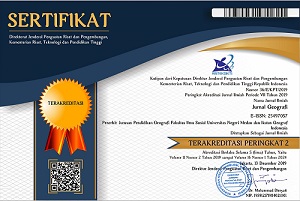Publication Ethics
Introduction
A 'code of conduct that outlines desired behaviour and obligations of members of the scientific profession is needed to publish an article in a peer-reviewed journal. Such a code of conduct attempts to optimize the advantages of science to society and the work. For example, the advancement of science necessitates sharing knowledge, even though this may sometimes forego any immediate personal benefit.
The publication of scientific research in journals is one of the fundamental ways JURNAL GEOGRAFI serves the geography science communities. For this purpose, editors, reviewers, authors and publishers have to maintain the high ethical standard relating to manuscripts in the JURNAL GEOGRAFI.
Editors
Editors have the following responsibilities:
- To decide which of the articles submitted to the journal should be published. Editors are accountable and responsible for everything they post.
- To decide to accept or reject a manuscript for publication with reference only to the manuscript's importance, originality and clarity, and its relevance to the journal.
- To acknowledge receipt of submitted manuscripts and ensure the fair, efficient, and timely review process.
- To assess manuscripts for the intellectual subject matter disregarding race, gender, religious belief, sexual orientation, ethnic origin, citizenship, or political philosophy of the authors.
- To guarantee that submitted manuscripts are handled in personal conduct, with no details being disclosed to anyone, except the reviewers, without the author's permission until a decision has been taken as to whether the manuscript is to be published.
- Not unveil any information about a submitted manuscript to anyone excluding the corresponding author, reviewers, potential reviewers, other editorial advisers, and the publisher, as appropriate.
- Not to use for their research, work reported in unpublished submitted articles.
- To act in response to any suggestions of scientific misconduct or convincing evidence that a published manuscript's primary substance or conclusions are mistaken, usually through consultation with the author. This may necessitate the publication of a formal withdrawal or amendment.
- To determine rationally responsive measures when ethical objections have been presented concerning a submitted manuscript or published paper associated with the publisher (or society).
Reviewers
Reviewers should:
- Only agree to review manuscripts for which they have the subject expertise required to conduct an appropriate evaluation and which they can assess on time.
- Acknowledge that peer review is a joint effort and undertake to conduct their fair share of reviewing and on time.
- Be objective and constructive in their reviews, abstaining from being hostile and from making offensive personal remarks.
- Have a non-influenced review, neither by the author's nationality, religious nor political beliefs of the author, gender nor other characteristics of the authors nor by commercial considerations.
- Treat any manuscripts received for review as confidential documents. Therefore, they must not be shown to or discussed with others except as authorized by the editor.
- Not use information obtained during the peer-review process for their own or any other person's or organization's advantage or to disadvantage or discredit others.
- Recognize relevant published work that has not been referred to by the authors. Any statement that an observation, derivation, or argument had been previously reported should be completed by pertinent reference.
- State all possible conflicting interests, looking for recommendations from the journal if they are hesitant whether something constitutes a relevant interest.
Authors
Authors have the following responsibilities:
- To present a report of the research that has been conducted ethically and responsibly.
- To present their results truthfully and without fraudulent, misrepresentation or improper data manipulation.
- To provide, if needed, the unprocessed data in connection with a paper for editorial review.
- To ensure that the work they submitted is original. If the authors have used the work and words, this has been appropriately cited or referred. Plagiarism in all its forms comprises unethical publishing manners and is intolerable.
- To describe their methods clearly and explicitly so that others can confirm their findings.
- Take collective responsibility for submitted and published work.
- The authorship of research publications should precisely reveal individuals' contributions to the work and its reporting.
- To disclose in their manuscript any financial or another substantive conflict of interest that might be construed to influence the results or interpretation of their manuscript. All sources of financial support for the project should be disclosed.
- Report to the journal editor or publisher without delay if an author notices a significant inaccuracy or erroneousness in their published work. They have to collaborate with the editor to withdraw or correct the paper.
Publishers
Publishers should:
- Define the relationship between publisher, editor, and other parties in a contract.
- Respect privacy (for example, for research participants, for authors, for reviewers).
- Defend intellectual property and copyright.
- Promote editorial independence.
- Work with journal editors to:
- Regulate journal policies appropriately and aspire to meet those policies, mainly editorial independence; research ethics; authorship; clearness and honesty; peer review, appeals, and complaints.
- Inform journal policies to authors, readers, and reviewers.
- Evaluate journal policies periodically.
- Preserve the integrity of the academic record.
- Support the parties in charge to investigate suspected research and publication misconduct and, where possible, assist in resolving these problems.
- Issue amendments, clarifications, and retractions.
- Publish content on a timely basis.























